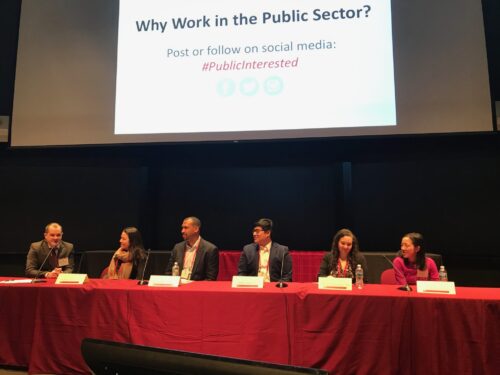2018 Conference celebrates service and Kristen Clarke ’97.
By CAROLINE CRONIN

The 2018 Public Interest Conference was held this past Saturday in the Science Center Lecture Hall B. The event this year was sponsored by prominent campus groups such as Philips Brooks House Association and The Institute of Politics and featured the keynote address of Kristen Clark, AB ’97, the President and Executive Director of the National Lawyers’ Committee. Those involved, both students and alumni, worked to include as wide a range of service and public interest minded individuals as would reflect and encourage those on campus searching for role models and ideas. Along with Clarke’s keynote address, featured in the program was a panel of recent Harvard graduates who have pursued careers devoted to public interest.

At Harvard, Clarke was involved in several activism movements, and unlike today’s more accepting environment they did not always earn her a favorable reputation or respect. As a member of Currier house, Clarke advocated against the randomization of the housing lottery. She also protested the implications of the book The Bell Curve, alongside other notable graduates such as Rashida Jones AB ’97. During her presentation, Clarke showed an image of the November 10, 1994 cover of this very publication, which featured students (Jones included) protesting the racist ideology present in The Bell Curve. Clarke also garnered the attention of other campus news sources that took a more critical view of her activism. Clarke admits these sources’ negative caricature of her was “crazy” (some things never change). Nevertheless, Clarke insists that it is always important to “fight both inside and outside the courtroom,” and to become a part of a “resistance.” The injustices which are worthy of students resistance and efforts are many and varied. Clarke was asked by members of the audience about problems that undergraduates may be facing now — like sexual assault and affirmative action. Clarke responded, “Feel empowered, speak up and resist when administrators are not fulfilling obligations.” She continued, “We stand by you; the places where you learn should be diverse places.”
Though the students and their inspired paths into the future were the focus of the discussion, it seemed that the older alumni present shared a common sentiment: a fear of disillusionment among the younger generations and the possibility that we as undergraduates might not take advantage of the resources and networks available to us in the public interest field. But that was what was so enlightening about the conference as a whole. Individuals take different steps to serve the public interest, and they do it with the skills and passions already imbued within them. It is Harvard and people and opportunities we encounter here that guide us on a path of public service to a more fulfilling life.
When asked about the conference’s affect on her, Jessica Morandi ’21 noted, “Hearing the alumni speakers at the Public Interested Conference gave me a much deeper appreciation for how broad of a field the public sector really is. Some of the most impactful moments for me were in seeing how a few young women had taken community, national, or even global issues and found concrete ways to combat them. The wisdom that I gained at this conference will definitely stick with me through my time at Harvard. The day reinvigorated my drive to make a positive impact on the world.”
It is the hope of Clarke and all contributors to the conference that the number of Harvard students interested in seriously pursuing a career in public interest will grow. Clarke reminds us, “A Harvard degree carries with it tremendous power and opportunity,” there is no end to the good that we may do with it.
Caroline Cronin (ccronin01@college.harvard.edu) as one who is constantly in desperate need for inspiration, found it in the words of Clarke, the panelists, and her peers.

